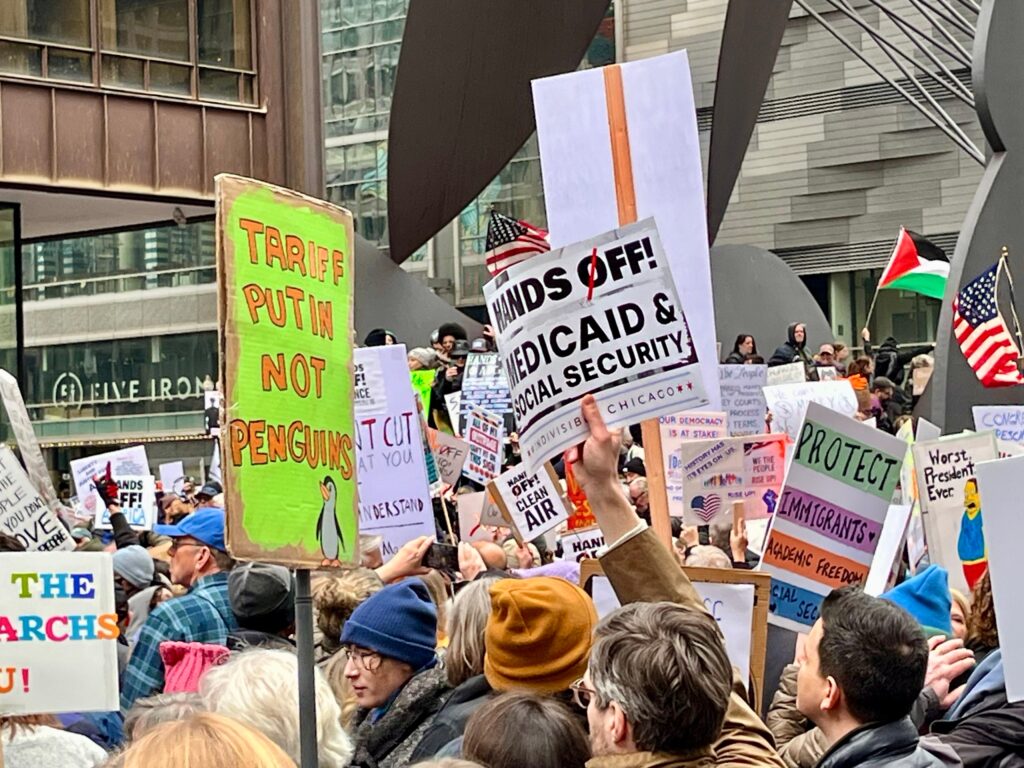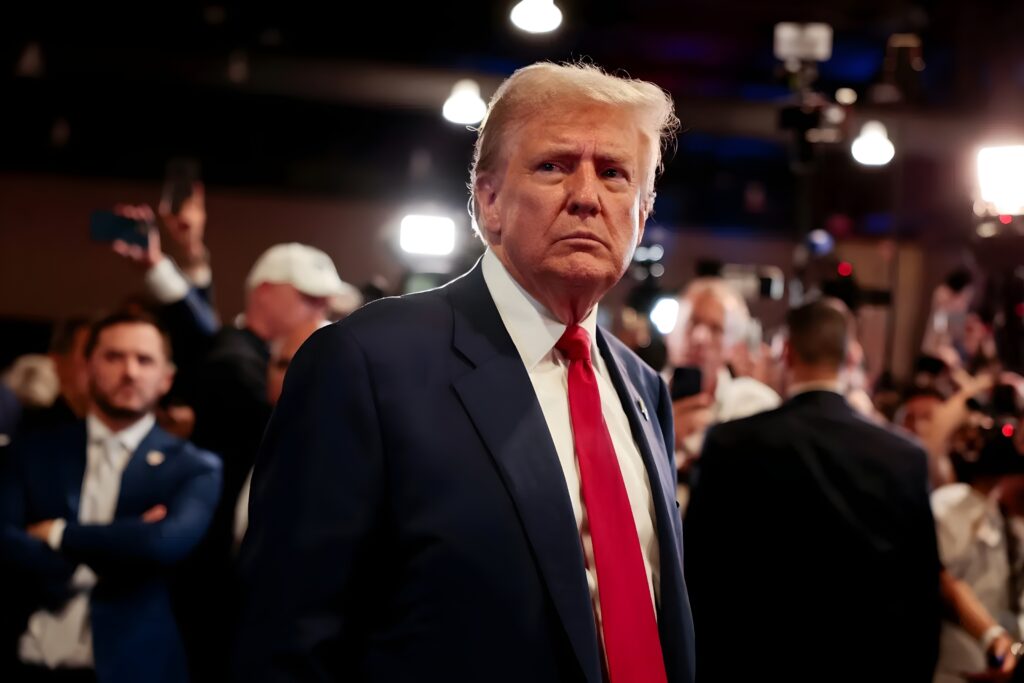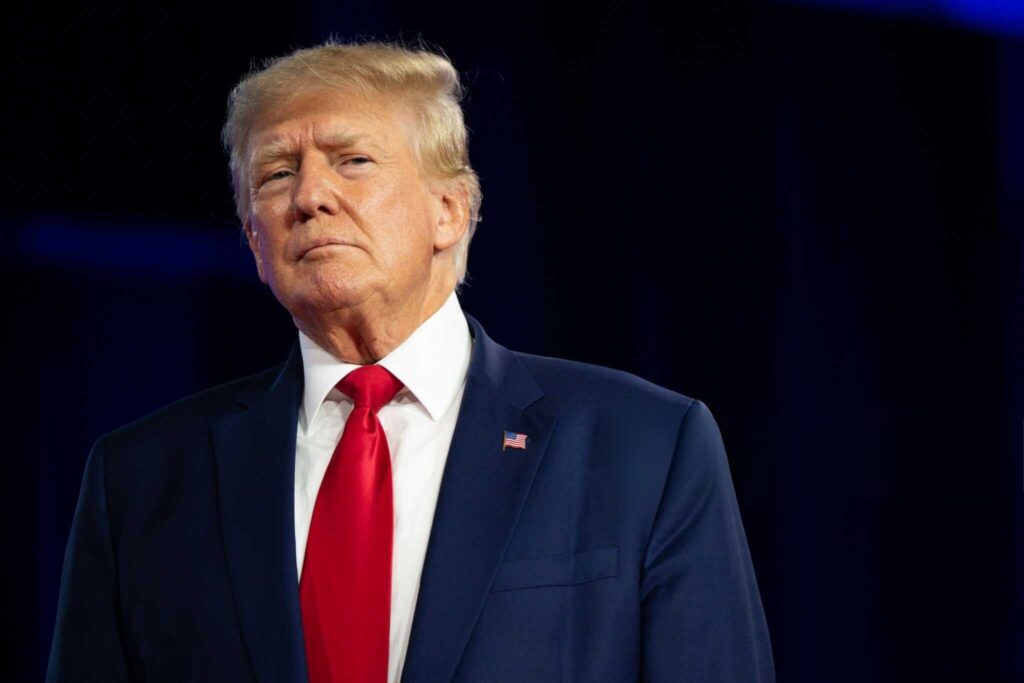In my previous essay, I wrote about the value of factions, and how liberalism’s strengths come from diversity and disagreement. I mentioned that diversity is hard because it asks us to tolerate views that we abhor. As Will Wilkinson has argued, the United States has been slowly sorting itself into two competing tribes that come with rather different sets of values.
A stark challenge for liberalism is managing this level of disagreement. Of course, we have a set of procedures that are designed for just that—they are embodied in the Constitution. The liberal order is built upon the rule of law, and so we might expect the Constitution to carry us through potential dark times and see us through to the other side. I want to suggest that a reliance on the law won’t be good enough.
In his Farewell Address, President Obama said:
Our Constitution is a remarkable, beautiful gift. But it’s really just a piece of parchment. It has no power on its own. We, the people, give it power. We, the people, give it meaning — with our participation, and with the choices that we make and the alliances that we forge.
Whether or not we stand up for our freedoms. Whether or not we respect and enforce the rule of law, that’s up to us. America is no fragile thing. But the gains of our long journey to freedom are not assured.
In his own farewell address, George Washington wrote that self-government is the underpinning of our safety, prosperity, and liberty, but “from different causes and from different quarters much pains will be taken… to weaken in your minds the conviction of this truth.”
And so we have to preserve this truth with “jealous anxiety;” that we should reject “the first dawning of every attempt to alienate any portion of our country from the rest or to enfeeble the sacred ties” that make us one.
America, we weaken those ties when we allow our political dialogue to become so corrosive that people of good character aren’t even willing to enter into public service. So coarse with rancor that Americans with whom we disagree are seen, not just as misguided, but as malevolent. We weaken those ties when we define some of us as more American than others.
When we write off the whole system as inevitably corrupt. And when we sit back and blame the leaders we elect without examining our own role in electing them.
It falls to each of us to be those anxious, jealous guardians of our democracy. Embrace the joyous task we have been given to continually try to improve this great nation of ours because, for all our outward differences, we in fact all share the same proud type, the most important office in a democracy, citizen.
Just Words On Parchment
Regardless of one’s political leanings, or one’s evaluation of Obama’s presidency, this is an important message. The liberal order is not the natural order of things. That we broadly have the rule of law and a republic is a remarkable social achievement. But this achievement can be strengthened or eroded through time.
As Obama noted, by themselves laws are just words on pieces of paper, and the Constitution is just words on parchment. In Western liberal countries, we often forget about this fact. Perhaps too often, when people of either party want to effect social change, they look toward Congress to pass a new law, or the Court to knock down, narrow, or reinterpret an existing law. What’s incredible about this is twofold: first, that we think that changing some words on paper has any kind of causal authority over our behavior, and second, that it largely does.
Undergirding those words on paper are our beliefs about them, and the actions we take in their defense. The rule of law, and our Constitutional order, rests on all of us actively ensuring that we all follow the rules. It’s not enough to have a personal interest in respecting the rule of law — we need everyone else to respect the rule of law as well. In other words, our institutions depend on social norms. Laws only rule if people largely follow them, and when someone violates the law, this is reported; when it is reported, the police care enough to arrest the person, a prosecutor thinks it is worth bringing a case to trial, and judge and jury are inclined to punish the crime.
We all agree to willfully ignore lots of laws — most of us jaywalk with impunity, many people drink alcohol before they are of age, and so on — but there are other laws we deem important enough to adhere to. Likewise with our political order. Politicians stay within certain bounds because they think we pay attention and would punish them for going beyond them. They do what we reward them for doing.
Building a Culture of Citizenship
Antanas Mockus, a fascinating political figure in Colombia, is best known for his terms as mayor of Bogota. In his time as mayor, he addressed a number of serious social ills: an incredibly high murder rate, sky-high traffic fatalities, rampant domestic violence, traffic police corruption, and a massive water crisis. Incredibly, most of what he did was not a matter of legal change, but a matter of what he saw as building up a culture of citizenship. He developed creative ways to help citizens monitor each other better and encourage healthier behaviors, all while developing a robust civic conversation about what kind of city Bogota wanted to be.
For example, to combat horrific traffic conditions, he fired traffic police, who were broadly seen as corrupt, and in their place hired a few dozen mimes who mocked rule-breakers at particularly congested intersections. He also distributed “red cards” and “green cards” to drivers, with instructions that they show a green card to someone who drove courteously, and show a red card to jerks.
As silly as this might sound, it worked to seriously reduce problems with traffic. The silliness itself was part of the point—it created a broad civic discussion around a social problem and what citizens wanted to do about it. This approach encouraged citizens to rethink their relations to each other, and decide that everyone would benefit if they followed the rules—even if violations were individually beneficial.
The incredible improvements that he oversaw were primarily about developing the social norms to go along with the legal structures already in place. There are many lessons to be mined from the successes and failures of the Mockus initiatives, but what is most remarkable is the degree to which he was able to shift behaviors in a large population relatively quickly — a matter of a few years — toward a greater respect for the law and a greater respect for fellow citizens.
The core of what he focused on was people’s tendencies to go for short-term personal advantage over long-term social well-being. It’s faster and easier to cut someone off in traffic rather than wait your turn (until no one follows traffic rules); it’s easier to win an argument with a gun than to work it out (until everyone starts shooting); it’s easier to get out of a ticket by bribing a police officer (until the police start demanding arbitrary bribes), and so on.
Mockus facilitated a broad civic discussion about what kind of social rules people wanted to follow. Largely, people wanted to give up on the social chaos that came from everyone seeking short-term advantage, and move toward a more orderly set of social rules that allowed people to more readily cooperate with each other.
The Erosion of Civic Norms
Our current political life should give us reason to worry that we are going through a rapid shift in social norms in the other direction. While the Trump administration seems to be accelerating some of these trends, the rot was already present. Trump has merely taken advantage of the existing weaknesses in our support for the liberal order.
Consider some basic shifts in Congress’ political behavior:
- The Senate filibuster is largely a rulemaking accident. It did not see any real use until the 1970s. From about 1970 to 1990, the filibuster went from being deployed about 20 times a session to about 40 times a session. It is now deployed well over 100 times a session. It has become so normalized that media coverage of senate votes cover whether a bill received “the necessary 60 votes.”
- Federal judgeships are sitting empty — 10% of seats are vacant — because Senators drag out the nomination process, sometimes for years, in an attempt to place more ideologically-friendly judges on the bench. This reduces our country’s ability to satisfy its constitutional obligation to offer a speedy trial.
- The Senate Majority refused to even meet with a Supreme Court nominee for more than 8 months, in the hopes that their Party’s nominee for President would win, and they could secure the seat for themselves.
- The debt ceiling, which was created in 1917 by statute, used to be routinely raised by Congress when required. In the recent past it has been used multiple times as a tool of brinksmanship, threatening the credibility of the United States in order to garner short-term political victories.
- The President of the United States was heckled during a joint session of Congress—by a sitting Congressman. This Congressman quickly raised hundreds of thousands of dollars for having done so.
- After the tragedy of the consulate attack in Benghazi, there were 7 Congressional probes into the causes of the attack. Congress spent more time investigating this attack than the 9/11 attacks. One Republican Congressman admitted that the extended investigations and leaks of the investigation were designed to weaken the expected Democratic nominee for President, Hillary Clinton.
Congress is not the only source of dysfunction:
- President Obama, after initially arguing he lacked the authority to unilaterally act on immigration or on modifications to the ACA, did so after being stymied by Congress. This almost assuredly went beyond his authority.
- There were repeated claims that the Clinton campaign “rigged” or “stole” primary elections in a number of states, despite a complete lack of evidence, or even a causal mechanism for how they could have done so.
Donald Trump has built his career in politics on top of the violation of norms:
- He gained initial political prominence for leading the “Birther” movement, arguing that then-President Obama was not a citizen, and thus not a legitimate President.
- He declared that Prisoners of War like John McCain are not legitimate war heroes, because they got captured.
- He declared that a Mexican-American federal judge should not oversee his case because he wouldn’t be able to be fair.
- He has both proclaimed that election results are accurate and that his popular vote loss was because 3-5 million undocumented immigrants voted as a bloc for his opponent.
- He declared that his political opponent ought to be jailed for using a private email server. His administration now uses one.
- He has repeatedly claimed that Muslim Americans “cheered” in mass celebrations after 9/11.
- He has decried a “so-called” federal judge for issuing a stay on one of his executive orders, and told his Twitter followers to blame the judge if any domestic terror attacks occur in the future.
- His administration has made up an attack — the “Bowling Green Massacre” — and has doubled-down on the claim by arguing that the media is covering up terrorist attacks as part of a larger conspiracy.
This list is obviously only partial. President Trump flaunts the social norms that hold our democracy in place, but he did not invent this tactic. Indeed, these norm-flaunting tactics pre-date Trump’s entry into politics. They have been practiced by political leaders of both parties, and embraced by the citizenry.
Rewarding Bad Behavior
These social norms have been broken because there was political advantage to gain by breaking them. Filibusters allow the minority party to slow down governance, and block initiatives from the majority party. They enable the minority party to deny the majority a victory. Because federal judges get lifetime appointments, politicians on both sides have strong incentives to try and wait out the other Party’s President and try and install as many judges as they can when they control the White House.
But since both Parties have realized this, we have simply failed to replace federal judges. The debt ceiling has become the newest and perhaps most dangerous source of leverage that Congressional Republicans have decided to wield. Rather than just hold the budgetary process hostage, they have elected to hold the creditworthiness of the United States hostage until they get policy concessions.
Playing chicken is a great idea until you realize that there is very little that separates winning and falling off of a cliff. So far, we have been lucky: each time there has been a debt ceiling fight, it has been resolved at the last minute. But we run the risk of normalizing this kind of approach to governance, and the more it happens the more likely we get unlucky.
The 2013 Budget Sequestration is an example of this. It was meant to be the Sword of Damocles in the 2011 Budget Control Act, requiring both parties to come to a reasonable agreement over targeted spending cuts, before aggressive indiscriminate cuts to the budget in no one’s interest kick in. The parties couldn’t agree, so indiscriminate cuts went into effect. Congressional Republicans are again considering this strategy for their revisions to the healthcare system: the “Repeal and Delay” strategy is meant to force them to do something to come to agreement before the insurance markets blow up as a result of repealing the taxing and spending associated with Obamacare—but not any of the insurance regulations that go with them (which can’t be modified by party line votes). The more this sort of approach to governance is normalized, the less stable our country becomes.
The Benghazi hearings were fishing expeditions, whose purpose was to sink the electoral prospects of Hillary Clinton. Since that tactic more or less worked, you should expect to see more of that in the future. Unless, of course, Congress and the Presidency are controlled by the same party. Rand Paul recently said: ““I just don’t think it’s useful to be doing investigation after investigation, particularly of your own party. We’ll never even get started with doing the things we need to do, like repealing Obamacare, if we’re spending our whole time having Republicans investigate Republicans. I think it makes no sense.” That is, Congress should exercise its investigatory powers only for partisan political gain.
In other words, professional politicians started breaking the social norms that allow for effective governance, and they were rewarded for it. They were rewarded with reelection, they were rewarded with extra donations, and they were rewarded with greater public profiles. Media organizations tacitly encouraged it, as outrageous behavior makes for better ratings and more clicks. We see pressure groups aligning to encourage Democrats to give Neil Gorsuch the Merrick Garland treatment—that is, to simply refuse to vote on his nomination to the Supreme Court. Money will be raised, and citizens will be mobilized, to push for this tit-for-tat behavior.
It was in this environment that Donald Trump rose to power. He was not the first to break the social norms that undergird the liberal order, but he has shown his willingness to go beyond those that came before him. Where some say their political opponents would be bad for the country, he encouraged chants of “lock her up” at campaign events. Where some decry unfair media coverage, he calls the media the opposition party and declares negative poll numbers to be “fake news.” Where some disagree with judicial rulings, he questions the legitimacy of the judges. Where some wonder whether our immigration policy is serving American interests, he works on building a massive wall and blocks green card holders from re-entering the country. He does this because he has been richly rewarded for it. His norm violations have been bigger than other politicians, and his rewards have been richer as well.
Punish Gamesmanship, Even When It’s Your Own Team
Social norms only stay in place if violators are somehow punished. The reason is obvious—pro-social norms, like those that help prop up the liberal order, constrain our short-term self-interest. Violating those norms are in our individual interest. Of course, it’s better to lie than tell the truth if the lie serves your purposes. But that stops being true if you think that others will punish you for lying. Of course engaging in brinksmanship with the full faith and credit of the United States is a great idea if you’re confident that the other side will back down first, and grant you your policy concession. But that stops being true if voters reject your risky behavior and vote you out of office before you can do lasting harm to the republic. Of course it’s a great idea to energize your base by promising to jail a politician they hate. But that stops being true if voters reject the practice of jailing one’s political opponents, as that is what authoritarian dictators do.
We could simply decry our politicians for these social norm violations. But we need to look at ourselves. We cheer them on when they are on our side. Democrats demanded that Obama take executive action on immigration. Obama was rewarded for it with higher approval ratings and praise from pressure groups. Republicans demanded that Congressional Republicans deny Obama a Supreme Court pick. And so on. We decry the awfulness of the other party, and delight in when our team does the same thing.
These problems stem from a common source. Our factions are all convinced that they can win. Not just win a policy victory — both sides achieve plenty of those — but total victory. There have been books and articles arguing for permanent majorities for both Democrats and Republicans. Candidates often lay out policies that could only occur if the country were to be utterly transformed and other factions disappeared. If we’re looking to achieve total victory, then surely we don’t have to pay much attention to the opposing side, because it won’t be around for much longer.
But no one will achieve total victory. It’s a big country, and temporarily weakened factions have a tendency to come back. So instead, we have to agree to mutually disarm — we need to give up on the goal of total victory, and instead focus on adhering to rules that we are comfortable with, regardless of whether our faction is in the minority or the majority. This requires that citizens and politicians recognize that other factions are going to sometimes be able to do things that they don’t like—but that’s very different from things that are illegitimate.
Relearning Disagreement
Other factions hold views that you don’t like, and they don’t like many of your views. But that is not because the other side is malevolent. They simply see the problems that we face in a different way, and prioritize different values. Policies that you don’t like are just part of the consequences of living in a large, diverse democracy. Losing a vote doesn’t mean that the other side cheated. It means that your faction didn’t convince enough other people that your side was right.
However, there are times when politicians really do step far out of line, and policies are against the rule of law. It is in these times that all factions need to work together to uphold the norms of liberalism. As much as we might disagree on policy details, and the priority of values, we all need to agree on the basic rules. When basic Constitutional principles—or basic liberal principles—are violated, we need citizens and politicians alike to be those anxious guardians of democracy that Obama spoke of.
For this to work—for liberalism to have the resources to defend itself—we need to be able to uphold the norms that enable the normal functioning of the rule of law. We need to be able to clearly distinguish between the normal ebb and flow of policy and the true threats that the liberal order faces. That requires that we all give up on visions of factional dominance, and instead submit to compromises and setbacks and tradeoffs, so we have the resources ready to nip authoritarianism in the bud.
—
Ryan Muldoon is Assistant Professor of Philosophy at the University at Buffalo and author of Social Contract Theory for a Diverse World: Beyond Tolerance.





